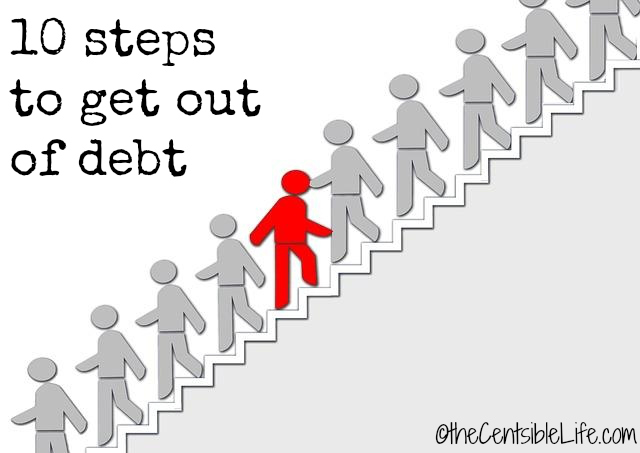Reducing debt is the cornerstone of leading a more financially sound lifestyle. With less debt you’ll have more money to save, invest, and to use for things you enjoy. Getting rid of debt is tough, but with these 10 steps you’ll be able to dig your way out of debt.

1. Create an emergency fund.
Without emergency money you will turn back to your credit cards to pay for emergencies. Single folks can usually set aside $500, but families should consider $1,000 to one month’s expenses since their expenses tend to be higher. Put the funds in an account you can’t touch.
2. Know your debts.
Make a spreadsheet with your debts, balances, credit limits, interest rates, and minimum payments. (Find free printables here.) By laying out all your debts you’ll be able to see what needs to get paid off first versus what can wait. You can also figure out what you truly owe.
Whether you keep your number on a whiteboard or track it in your computer watching the amount you owe drop will keep you motivated.
3. Make a plan.
Make a plan to get out of debt. Whether you choose to use a debt snowball, debt avalanche, or other methods the key is sticking to the plan.
Set yourself up for success by making the plan doable. Don’t try to slash 40% off your spending, and pay off your debt. Start smaller. You can always ramp up your debt payments as you scale back your lifestyle and spending temporarily.
4. Negotiate if possible.
While not all debts are negotiable, many are. For instance, call your credit card companies and negotiate a lower APR. Check to see if they have balance transfer offers that will help you reduce the interest you are paying. Check into refinancing loans to see if it would be worth it.
5. Pay more than the minimum.
It should go without saying but paying only the minimums will take you years and potentially thousands of dollars in interest to pay off. Focus on your first debt and throw whatever you can at it, but don’t be afraid to round that $66 payment up to $70 either.
6. Find more money to pay off debt.
Paying off debt faster will become addicting once you start seeing those balances drop. Find more funds to reduce your debt by slashing expenses.
Some small ideas to consider cut cable, get rid of your gym membership, sell your old stuff, or cook more at home.
Consider bigger changes like moving to less expensive housing or getting rid of your car.
7. Make more money.
Making more money will allow you to pay off your debt faster. Whatever your skills are you can create a side gig to reduce your debt.
For instance, a teacher could tutor kids after school or a yoga enthusiast could teach a yoga class. Essentially you’ll use your work skills to create a side business like a wed development company or editing papers for college students.
8. Don’t acquire new debt.
It’s tempting to use your freshly paid off card to upgrade the bathroom, or buy a new pair of shoes you had your eye on. Don’t let you talk yourself into more debt.
Instead stash that card away somewhere and use it to pay for a monthly bill (say your Netflix subscription) and have it automatically paid off each month. That way it’s still ‘active’ and will help your credit score without tempting you to spend money you don’t have.
9. Celebrate your wins.
Every time you have a win take time to celebrate! While I don’t recommend going on a spending spree, spending a little cash on a ‘treat’ will help reinforce your behavior and have you paying off all your debt in no time.
10. Make it fun.
After time you may lose steam when it comes to paying off your debt. Keep it interesting and fun by creating milestones you can celebrate, making a game of saving more in your day to day life (like using coupons and deals to spend less) or having a game to see who can find the most money by selling used items you no longer need.
Whatever method or steps you use to get out of debt the key is to keep working towards your goal. You may falter, or make mistakes, but dust yourself off and get started again.
What are successful ways you’ve used to conquer debt? If you’re still working on paying off your debt, what’s working for you?






















